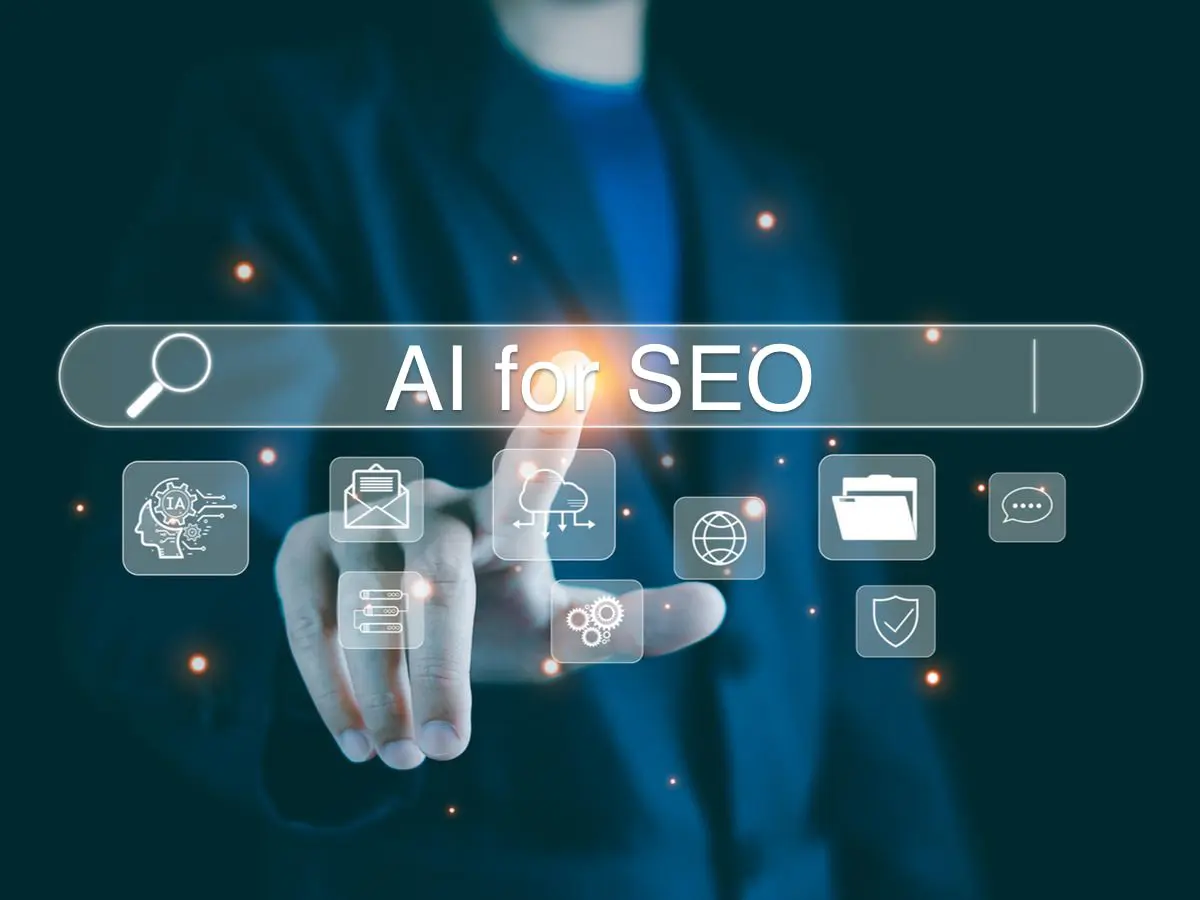Introduction to Gen AI and SEO
Understanding Gen AI
Generative AI (Gen AI) is transforming how businesses approach their digital strategies. In simple terms, Gen AI refers to advanced software that can create content, analyse data, and generate insights, mimicking human-like understanding. This technology is becoming increasingly accessible to small businesses, allowing them to compete more effectively in the digital landscape. For example, imagine a small local bakery that previously relied solely on word-of-mouth marketing. By using tools that leverage Gen AI for SEO, they can automate social media posts, generate engaging content for their website, and even predict customer preferences. Generative AI for small business allows those businesses to connect with customers in a way that was once limited to larger companies with massive marketing budgets.
Importance of SEO for Small Businesses
Now, let’s talk about Search Engine Optimisation (SEO). For small businesses, having a strong SEO strategy is crucial. But not everyone knows how to get on board the SEO train, or even what it is! So:
What is SEO?
Search Engine Optimisation (SEO) is a crucial digital marketing strategy that can significantly enhance the online visibility of any business, especially for small enterprises looking to establish their presence in a competitive market. At its core, SEO involves optimising your website and content to rank higher in search engine results pages (SERPs), making it easier for potential customers to find you.
For small businesses, implementing effective SEO practices can level the playing field against larger competitors. By focusing on relevant keywords, creating high-quality content, and ensuring that your website is fast and user-friendly, you can attract organic traffic without the hefty price tag of paid advertising (sometimes known as ‘pay per click’). Moreover, local SEO strategies specifically cater to businesses targeting customers within their geographical area—ensuring that when someone searches for services you offer nearby, your business appears prominently.
Investing time and resources into SEO not only helps improve your rankings but also builds credibility and trust with your audience — higher search engine rankings help potential customers trust in the quality of your products and services. In today’s digital landscape, understanding and leveraging SEO is not just beneficial; it’s essential for small businesses aiming for sustainable growth and success in the modern digital age.
Should I Handle My Own SEO, or Should I Hire Someone Else?
This is a surprisingly complex question, and the answer often hinges on your specific circumstances and goals. On one hand, managing your own SEO can be a cost-effective solution, especially for small businesses or individuals with limited budgets. It allows you to have complete control over your strategies and enables you to learn valuable skills that can benefit your online presence and marketing efforts in the long run.
However, SEO is a complex and ever-evolving field. The algorithms used by search engines are constantly changing, and staying up-to-date with best practices — including how to leverage generative AI technologies — requires time and expertise. If you find yourself overwhelmed by technical jargon or unsure of how to implement effective strategies, hiring an experienced SEO professional may be a wise investment. They can provide tailored solutions that align with your business objectives while ensuring compliance with current trends.
Ultimately, consider the resources at your disposal — both time and knowledge — and weigh them against the potential benefits of professional expertise. If you’re serious about enhancing your online visibility and driving traffic effectively, enlisting an expert could save you considerable time and yield more significant results than going it alone — but that depends entirely on the amount of time and knowledge that you yourself can bring to the table!
To simplify the question, here’s another question to consider: at the end of the day, do you really have time to run marketing efforts on top of running the business itself? If the answer is yes, it may be worth investing time and energy into learning how the new SEO landscape works, wrapping your head around all the jargon and technical stuff, and doing it all yourself. If the answer is no, it’s time to hire an SEO agency.
Evolution of AI in SEO
Traditional SEO Practices
Despite the new wealth of assistance that AI for SEO can bring to the table, the basic principles of SEO has remained largely the same — which can be broken down into 3 basic pieces of the SEO puzzle:
- Keyword Research: Identifying high-traffic, relevant keywords that potential customers are using to find businesses like yours.
- On-Page SEO: Once you are aware of what keywords to target, it is now a matter of including those keywords on the page — meaning that on your website, across any pages you want showing up in search engine results, you must strategically place these keywords in the text content, in headings, even in the MetaTags and file names of images!
- Link Building: Gaining backlinks from authoritative sources to boost credibility — both in the eyes of search engines, and in the eyes of consumers. This can include having regularly updated pages for your business on social media, but can also include getting listed on online directories, getting interesting articles about (or associated with) your business published on news websites and blogs, and/or getting other businesses or influencers to link to your website.
The problem that many small business owners and marketing agencies come across is the sheer amount of effort required to cover each of these parts — both correctly, and in tandem with the other pieces. Before AI, SEO often involved spending hours sifting through lists of keywords, writing original and compelling content, ensuring your website has the appropriate meta tags, sourcing appropriate imagery… the list goes on and on.
Integration of AI in SEO Strategies
Fast forward to today, and AI is beginning to revolutionise the SEO landscape. It has taken away a lot of the guesswork and streamlined some SEO processes. AI tools can analyse massive sets of data within seconds to determine the best keywords and content strategies. Consider this: Instead of manually researching keywords, a small business can now use specialised tools built with AI for small business owners to get instant recommendations based on current trends and competitor analysis. Benefits include:
- Automated Content Creation: Generating blog ideas or even full articles based only on keyword performance & relevancy.
- Predictive Analysis: Forecasting which keywords will trend and allowing businesses to adjust their strategies proactively.
- Enhanced User Insights: Understanding user behaviour more deeply, which allows you to tailor content towards the consumer audience you have garnered thus far.
By integrating AI into their SEO strategies, small businesses can work more efficiently, stay ahead of trends, and ultimately drive more traffic to their websites.
Implementing AI Tools for SEO
Keyword Research and Analysis
Effective keyword strategy is the backbone of successful SEO, but traditional keyword research can be time-consuming and often misleading. AI tools, however, can streamline this process dramatically. For instance, imagine a family-owned bakery looking to increase its online visibility. Instead of manually searching for “best pastries” and estimating search volumes, the bakery can use AI tools that analyse millions of searches, helping them discover long-tail keywords like “gluten-free pastries near me” – keywords that might attract more specific customers. Key benefits of using AI for keyword research include:
- Automated Suggestions: AI algorithms can propose relevant keywords based on current trends and competitors’ rankings.
- In-depth Analytics: These tools provide insights on search volume, keyword difficulty, and relevant questions consumers are asking.
- Real-Time Data: Instant updates mean business owners can pivot strategies on the fly.
Content Optimisation Techniques
Once the right keywords are identified, the next step is ensuring that the content is optimised for those keywords effectively. This is where AI for SEO shines through advanced content optimisation techniques. Consider a local florist aiming to boost its online orders. By using writing and analysis tools made using AI for small business owners, the florist can not only ensure that their blog posts and product descriptions contain relevant keywords but also receive recommendations on related topics and phrases that enhance SEO. Here are some powerful content optimisation techniques provided by AI:
- Readability Scoring: AI tools offer suggestions to make written content more engaging and accessible.
- Semantic Analysis: They can analyse top-ranking content to recommend related phrases and topics to include.
- Content Gap Analysis: AI identifies gaps in existing content compared to competitors, urging businesses to fill those gaps with tailored content.
By harnessing these AI-driven strategies, small businesses can create high-quality, optimised content that captures the attention of both search engines and potential customers, ultimately driving more traffic and increasing sales.
The Result
The two big results that you get out of employing these techniques are:
- Enhanced user experience: With AI-driven insights, you can find out what your target market is searching for (and clicking on!) in Search Engine Results Pages (SERPs). With this information, you can begin to understand your target market on a deeper level: their pain points, their questions & concerns, and their entire reasoning for wanting your product or service! This allows you to create highly tailored content that resonates with your audience, promote products / services / content that the audience is most likely to be interested in, and even give you an idea of how your businesses website should be designed — both aesthetically and functionally.
- Improved Search Engine Rankings: This is why you’re here, right? Well, If you’re following along so far, you’ll be happy to know that — though keyword research, on-page optimisation, and backlinks are crucial to your success in search engines — understanding and properly engaging with your audience is just as crucial. You can research, optimise, and build backlinks all you want, but if you don’t take the time to properly analyse and understand the target market, you will only achieve the briefest of successes on Google, Bing and anywhere else. For continued success on search engines, Your audience has to want to click on your website in the SERP, stay on your website long enough to read your content, and hopefully even share your website with their friends! On search engines, success is granted through success — that means that while you can get on the first page of Google with some basic optimisation and a few backlinks, you won’t last very long there if nobody is clicking on you.
Challenges and Limitations of Gen AI for Small Business SEO
Data Privacy Concerns
While the advantages of generative AI for SEO are compelling, it’s essential to acknowledge the challenges, particularly around data privacy. As businesses leverage AI to collect and analyse customer data for personalised marketing, they must navigate a complex landscape of privacy regulations and consumer expectations. For instance, consider a small online retailer that uses AI tools to gain insights about its customers. If mishandled, this data can lead to serious privacy breaches, potentially damaging the company’s reputation. With laws like GDPR and CCPA in place, businesses must ensure they have clear consent from consumers and implement robust data protection measures. Here are some key considerations regarding data privacy:
- Transparent Data Practices: Clearly communicate what data is collected and how it will be used — even if you are afraid of how your data collection practices look, being transparent with your audience fosters trust with consumers.
- Regular Audits: Conduct routine checks to ensure compliance with privacy regulations and ethical data practices.
- User Control Options: Allow customers to manage their data preferences easily with a popup or plainly accessible settings.
Balancing Automation with Human Touch
Another challenge is finding the right balance between automation and maintaining the human touch. While AI can automate tasks and streamline processes, it can’t replicate the authenticity and personal connection that small businesses often offer. For instance, a family-run café might rely on AI to manage customer communications, but customers may feel more valued with personalised notes or direct replies from staff. To navigate this challenge, small businesses can:
- Blend AI and Human Interaction: Use AI for data-driven insights while ensuring staff maintains personal engagement with customers.
- Train Employees: Equip staff with the skills to use AI tools effectively, enabling them to use the technology to save time and enhance the customer experience without sacrificing that personal touch.
- Leverage AI for Efficiency: Automate the more mundane tasks while freeing up time for team members to focus on relationship-building.
The Future of Gen AI for SEO
As we reflect on the integration of generative AI in the realm of small business SEO, it becomes clear that the future holds immense potential. The shift towards AI-driven strategies is not merely a trend but a fundamental transformation that — when used effectively & responsibly — can empower small businesses to compete on a larger scale. If you need a digital marketing strategy that is streamlined, effective and actually gets you business — AI, in the right hands, can help you immensely.
To find out how AI-driven SEO strategy can empower your business, contact SEO Australia today to get your free 20-minute live video consultation.


